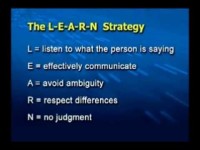We continue this week with strategy #4 Respect Cross Cultural Differences, the R of L E A R N. Effective cross-cultural communication can be difficult if you have trouble showing respect for another’s cross cultural differences. A low score here does not mean that…
The global neighborhood is a major factor in today’s business world, and so Intercultural business communication skills have become a must for teams at all levels of an organization to comfortably interact with cultures other than their own. At its most basic definition, culture refers to a group, or community, whose members share similar experiences, worldviews, and values. Up until a few generations ago, most Americans worked solely with local counterparts who shared similar backgrounds. Today, thanks to the pace of technology solutions and globalization strategies, it is probable that your typical workday includes interactions with remote team members, clients or vendors working from different parts of the globe.
As the pace of business transactions quickens, the ability to communicate with and manage people from other cultures is not just a necessity; it is a requirement for building effective teams and working across time zones. Confronted by language barriers, different worldviews and experiences, intercultural business communication can pose a great challenge. However, not meeting these context culture team challenges can be costly, setting a project back days, weeks or even months. Communicating Through a Global Lens effectively greatly augments your success when working and negotiating with individuals from diverse backgrounds.
In 1993, Dr. Farid Elashmawi, the late expert on multicultural management practices and Context culture reengineering, noted that “…the new world market will not only be international, but (also) intensely intercultural. The country or company whose citizens have the greatest competency [at relating to other cultures], all else being equal, will gain this competitive advantage.” (Multicultural Management, New Skills for Global Success, 1993). More than two decades later these words continue to resonate, as organizations are forced to align effective business practices in a tough competitive environment.
To dig deeper, by culture, we mean the shared mental programs that conditions individuals’ responses to their environment. It is based on common experiences shared with a particular group of our fellow human beings. Further, it is both learned and enduring- some aspects of culture are built into institutions, while others are passed on through generations. Lastly, culture is a filter that influences behavior; often the mental programming that creates this filter is unconscious, and therefore even more powerful. Even when we interact with others with whom we share core values misunderstanding often occurs. Imagine, then, how many more communication obstacles we face when dealing with others interculturally.
This blog section provides strategies, tips, and solutions to solve problems leading to building effective intercultural business communication or as we refer to it, cross cultural communication, or CCC. With an open mind, anyone can master the intricacies and practices of effective CCC interactions and meet the growing demands of conducting business in our global neighborhood!




